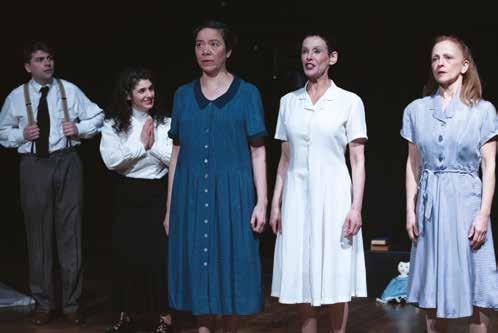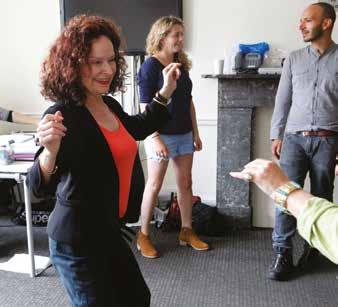
3 minute read
FAMILY MATTERS
We chat with Writer and Director of the new hit play A Manchester Girlhood, Julia Pascal.

narrative, reflecting the way that we recall and experience memories: “It’s very dreamlike and fragmentary. It takes place from childhood to death, so I have women in their 50s and 60s playing children and 80 year olds, so it also defies the concept of age. The narrative jumps around all the time, just as you do in your own head. I’m trying to show the inside of every person’s head in a way.” double identity. There’s this old country Yiddish Romanian culture that has been transplanted into Manchester.”
A Manchester Girlhood is a new play written and directed by Julia Pascal, focusing around the stories she was told by her own family members about growing up in Manchester: “It’s quite a biographical piece about my mother, her sisters, and my grandparents, who were Romanian Jewish immigrants to Manchester around 1910. It’s really a look at the 20th century through the eyes of these three daughters. It’s both political and personal and it tells a larger story about what is going on in the world.”
The play progresses as a non-linear
It was important to Julia to centre the narrative around women’s lives: “How to you showcase women’s lives beyond the domestic sphere? I feel that most theatre dramas focus on male narratives, and the women are secondary. It was important for me to show world events from the eyes of women.”
The play sticks extremely closely to the stories Julia was told as a child: “I’m like a sponge, I absorb stories. I’m always asking people about their life stories. I realised I must have done that from childhood. The rhythms of these women’s voices and the patten of their thinking has a
Despite the personal subject matter, Julia didn’t struggle to put these stories to paper: “For one thing everybody’s dead, so there’s no one to say: ‘How dare you!’ it was a kind of feeling of commemorating them, bizarrely enough. I felt that I was honouring them and giving them meaning and presence. At times their obsessions become very funny. It gave me perspective. When you’re a child you take everything very seriously. When people say terrible things, you take it literally. But when you put that on the stage it shows the whole background and mental state of the person, so you’re showing the whole person as much as you can in one hour.”
Julia is hoping that the performance will impart a renewed interest in her family’s stories on the audience: “I want them to think about their mothers and their aunts and their grandmothers and all the women in their family whose stories they’ve perhaps not asked, and to realise how valuable they are. And also just to think about history not solely being a male narrative. There are many women’s stories which are not told and which you have to route out in archives.”
You can catch the play at Burgh House, London on 17th May and at JW3, London from 21st to 23rd May 2023
The community's beloved Jewish Theatre Company provided a much-needed evening of entertainment this March when they performed Neil Simon's California Suite in a new theatre called The Empty Space near Salford Quays. It was good to see the theatre full on the night I went; a sign perhaps that good entertainment can survive events like COVID-19 and the cost of living.
A little lower key than his more famous Plaza Suite, California Suite presents the audience with the stories of four different couples who were staying in room 203 of a particular hotel in a summer season in California. Four separate playlets, four separate scenarios, and four very different presentations. The first, a divorcing couple discuss their differing plans for their daughter, neither are fully able to take or relinquish responsibility for her, or indeed to finish off their marriage. We see sharp exchanges from smart New Yorker Hannah, (Liz Reuben), prevarication, weakness, and self-indulgence from William (Julian Kosky).
In scene two Jaysen Lewin and Deborah Loofe play a husband trying to hide a very embarrassing secret from his wife. Her resentment at his family and his defensiveness cover up the truth – which is already known to the audience – and make for quick thinking from him and languid suspicion from her. Ending with her inevitable discovery of a hooker in his bed, the scene descends into chaos and feeble excuses.
After the interval two leading lights of the JTC, Deborah Finley and Howard Glass, superbly demonstrate how a brittle actress’s disappointment at the Oscars destroys her fragile ego, leading her to accuse everyone around her – including her long-suffering husband – of treachery, in an attempt to bring them all down with her. A masterclass of good writing, timing, and excellent accents, they showed how with the wrong temperament, disappointment can turn into self-destruction in an instant. The last









